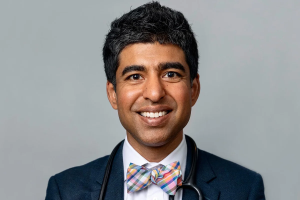The Race to Value Podcast

Ep 159 –The Mission of Equity in Black Maternal Health: Building Trust, Improving Outcomes, and Turning Pain into Power, with Dr. Neel Shah

It is Black Maternal Health Week, and this week’s episode provides context and value-based solutioning on how to address the alarming rise of maternal mortality in the U.S. We have horrifically poor maternal health outcomes in the African American population of our country, and it is directly attributable to a flawed design of our healthcare system juxtaposed with the presence of longstanding and systemic institutional racism. If there ever was an opportunity for improving health equity through value-based care, it is with this moral imperative to ensure the fundamental human right to have a safe and evidence-based childbirth that optimizes the chance of survival. On this week’s podcast, you are going to hear from one of the leading voices in health equity, reproductive justice, and value-based maternal health.
Our guest is Dr. Neel Shah, the Chief Medical Officer of Maven Clinic, the world’s largest virtual clinic for family health care. He is also a visiting scientist at Harvard Medical School where he previously served as a professor of obstetrics, gynecology and reproductive biology. Dr. Shah has been recognized with the Franklin Delano Roosevelt Humanitarian of the Year Award from the March of Dimes for his impact on maternal health in the United States. He is featured in the films Aftershock, which won the Special Jury Prize for Impact at the 2022 Sundance Film Festival, and The Color of Care from the Smithsonian Channel and Executive Producer Oprah Winfrey. As a physician-scientist, Dr. Shah has written landmark academic papers on maternal health and health care policy, and contributed to four books, including as senior author of Understanding Value-Based Healthcare. He is listed among the “40 smartest people in health care” by the Becker’s Hospital Review, and he currently serves on the advisory board of the National Institutes of Health, Office of Women’s Health Research.
In this podcast, we discuss a special documentary that Dr. Shah contributed to called “Aftershock”. This inspiring film on black maternal health equity turns pain into power and should be watched by all who strive to make a positive change in American healthcare. Join us on April 12th, for a screening of the Aftershock documentary and a discussion with other attendees.
This podcast is dedicated to Shamony Gibson, Amber Rose Isaac, Kira Johnson, Maria Corona, Sha-Asia Semple, Cordielle Street, and the thousands of women who have lost their lives in the United States maternal health system.

Bookmarks:
01:30 Black Maternal Health Week and the fundamental human right to have a safe and evidence-based childbirth that optimizes the chance of survival.
02:15 Introduction to Dr. Neel Shah, one of the leading voices in health equity, reproductive justice, and value-based maternal health.
03:30 AFTERSHOCK, is an original documentary on black maternal health equity. (Watch Trailer and attend special free virtual screening on April 12th).
04:00 Support Race to Value by subscribing to our weekly newsletter and leaving a review/rating on Apple Podcasts.
04:15 This podcast is dedicated to Shamony Gibson, Amber Rose Isaac, Kira Johnson, Maria Corona, Sha-Asia Semple, Cordielle Street, and the thousands of women who have lost their lives in the United States maternal health system.
05:30 Since 1970, we have seen a 500% increase in C-Section procedures over vaginal deliveries, with the rate of C-sections among black birthing persons being much higher than the general population.
06:00 C-sections bring in an average of $10k per procedure, compared to an average reimbursement of $4,500 for a vaginal delivery.
07:30 “Childbirth is the most utilized healthcare service in the United States of America and accounts for 25% of all hospitalizations.”
08:30 The opportunity to extract more “value” in the maternal health system.
08:45 “In childbirth, we predominantly have a “too much too soon” problem. One in three receive a major surgery to give birth, and one in ten babies go to ICU.”
09:00 Profit margin of 50% per case has normalized C-sections, despite the overwhelming adverse outcomes and contra-indications for most C-sections performed.
09:30 How the surgical apparatus for childbirth creates flawed financial incentives.
09:45 The institutionalization of both birth and death in the American healthcare system.
10:30 Pregnancies are the easiest episodes of care to define and that lends itself readily to bundled payments.
11:00 The need to pay less for C-sections and the need to pay more for vaginal deliveries.
11:30 The maternal mortality rate for black women is 43 per 100,000 which shows that they have a pregnancy-related death risk that is 3-4X greater than that of white women.
12:45 “The wellbeing of Moms is a bellwether for society in general. Every injustice in society shows up in maternal health and maternal health outcomes.”
13:30 The high degree of racial inequity across outcomes, which include death, morbidity, undertreated illness, economic disempowerment, and social isolation.
14:00 The data shows that anti-black racism contributes to the most severe forms of health inequities.
14:30 How public health data has conflated race and racism in interpreting evidence-based practices in medicine.
15:30 The flawed maternal health outcomes calculator that erroneously downgrades patients for being black as a physiologic indicator.
16:15 “Redlining in healthcare” – how historical racism in urban planning decisions creates social barriers and leads to systemic health inequities.
16:45 The 1921 Tulsa Race Massacre as an example of how the legacy of racism contributed to the worst maternal health outcomes in the country (still persisting to this day).
17:45 Black moms often aren’t dying of the medical condition like what is stated on their death certificate…what they are really dying of is failure of communication.
18:30 Disparities in health literacy can have serious consequences for the health outcomes of Black individuals.
19:45 Joint Commission: 80-90% of sentinel events (near misses, deaths) are due to failures of communication and teamwork.
20:00 Communication and teamwork are the ultimate artisanal crafts in medicine, but medical schools traditionally do not teach this.
21:00 Childbirth is the ultimate team sport, but “the team” only forms for the first time upon the onset of delivery.
22:00 Dr. Shah discusses how a communication whiteboard in the maternal health setting can improve both teamwork and patient outcomes.
23:30 The importance of collaboration in an interdisciplinary care team.
24:00 The longstanding racism in the medical establishment that leads to multigenerational distrust of the health system.
25:00 “The existential challenge for the healthcare system in 2023 is trustworthiness. The job is not for patients to be more trusting of us; we need to be more trustworthy.”
26:00 How the legacy of the institution of slavery commoditized the reproductive potential of people and contributed to anti-black racism.
26:45 The insidious nature of adequately responding to pain reported by African American patients in the healthcare setting.
27:00 Racism in healthcare is systemically embedded and irrespective of status or income. (Examples include Serena Williams, Beyonce, Meghan Markle.)
27:15 How racism is embedded in medical textbooks.
27:45 Horrendous racist medical experiments (e.g. Tuskegee Experiment, Henrietta Lacks, “welfare queens”)
28:00 The three criteria of trustworthiness: Competence, Affirm Dignity for People’s Lived Experience, Reliability.
28:30 The competency of reliability is what we furthest from in the healthcare system.
30:00 J. Marian Sims, the father of gynecology, developed the C-section procedure so slaves could avoid fistulas from vaginal births to produce more slave labor.
31:00 Despite the longstanding track record of racism in maternal health, journalists didn’t really start telling the telling the story of back women dying in childbirth until 2018.
32:30 Injustices in society comprise gender inequity, racial inequity, geographic inequity, and generational inequity.
32:45 The pervasiveness of generational inequity in our politics, e.g. MAGA, Build Back Better.
33:00 “Hope, opportunity, and progress in our country are eroding in our country. There is empirical evidence that this is true. We see it in policing, educational attainment, and maternal health.”
33:30 The danger of leaving African Americans behind in the pursuit of generational equity.
33:45 The most convincing evidence that racism still exists in America in 2023 (comparing risk of wealthiest black woman to poorest white woman).
34:00 Dr. Shah speaks about his personal experiences traveling across the country to better understand maternal health inequities.
35:00 How George Floyd and BLM movement changed awareness for the presence of racism in healthcare.
35:30 Maternal mortality is the lagging indicator and recent increases are discouraging (despite that leading indicators are strong).
36:00 Avoidance of preventable deaths are an improving leading indicator.
36:30 Maven Clinic is the world’s largest virtual clinic for family health care that offers continuous holistic care for fertility and family building.
39:00 Loretta Ross as an inspiration for optimism in reproductive justice (“making sure the chain doesn’t break at your link”)
40:00 Dr. Shah provides an overview of the Maven Clinic and how it “thinks differently” in providing a model for health.
41:00 Providing a model for care, support, and access by meeting people where they are.
42:30 Earning trust through the provision of virtual, cultural-affirming care.
43:45 Developing economies of scale through technology.
44:00 “Social determinants of health need a hyper-local response, especially when it comes to material needs like food and housing.”
44:30 How Maven Clinic employs a short-form digital SDOH screening tool that reduces barriers to identifying addressing social needs.
45:00 Defining loneliness and why community partnerships are so important in the birthing process.
45:45 “The birth equity movement is in a similar place that the HIV/AIDS movement was in the late 1980’s. There are a proliferations of CBOs galvanizing on behalf of their community.”
47:30 Identity shift from academic physician to technology executive and CMO (WSJ: “Obstetrician Neel Shah Joined the Telehealth Revolution”)
49:30 How COVID-19 caused an awakening within Dr. Shah to make a more outsized impact on maternal health equity at a national level.
50:45 Building a Car Instead of a “Faster Horse” – seizing the disruptive opportunity for innovation in maternal health.
51:30 “Correctly deployed science gives you confidence in what you think you are observing is true. It then allows you to create products that can fit into markets and drive scale.”
54:30 Parting thoughts of inspiration from Dr. Shah’s experience as a contributor to the Aftershock documentary.
56:00 “Historically, the healthcare system has treated people’s experience as a secondary luxury after you made them safe. We got it backwards – the way you make people safe is by attending to their lived experience.”






 Visit Podcast Website
Visit Podcast Website RSS Podcast Feed
RSS Podcast Feed Subscribe
Subscribe
 Add to MyCast
Add to MyCast